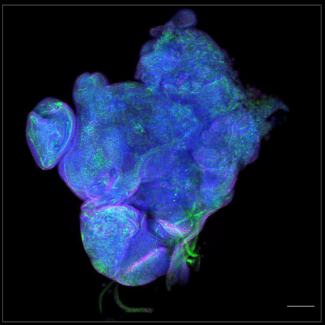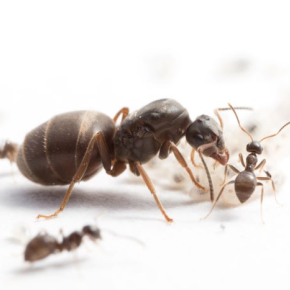
Social control among ants: queen’s specialization requires workers’ presence
A team of scientists1 led by a CNRS researcher has discovered that egg production is not an intrinsic specialization of queen ants, but that this behaviour is governed by the presence of worker ants.
Specialized from birth in the laying of eggs, the queen does not tend to the other tasks necessary for the proper functioning of her colony, as they are the responsibility of worker ants. However, the research team observed that a queen experimentally isolated from her workers developed nonreproductive behaviours, including brood2 care, less than 24 hours later. When one or two workers are returned to the colony, the queen ceases brood care and dedicates herself to egg production. Hence it is the presence of workers that keeps the queen specialized in that reproductive task. The scientists further noted that it is specifically the activity, and not merely the presence, of workers that exerts this effect on the queen: if workers are nearby but prevented from performing their brood care duties, the queen does so in their stead.
The fruit of 17 experiments and the study of 3,360 hours of video recordings, these findings contradict the hitherto prevailing view that the specialization of queen ants is innate and irreversible. This discovery of a social control of specialization could transform how we understand the functioning of insect societies, including those of bumblebees, honeybees, termites, and wasps, all of which, like ant colonies, are considered highly specialized superorganisms. The team’s study, to be published on 26 March in Functional Ecology, underscores the crucial role of social environment in the shaping of behaviours and raises new questions about the division of labour within insect societies.
Ontogeny of superorganisms: Social control of queen specialization in ants. Majidifar V, Psalti MN, Coulm M, Fetzer E, Teggers EM, Rotering F, Grünewald J, Mannella L, Reuter M, Unte D et Libbrecht R. Functional Ecology , March 26, 2024.
DOI: https://doi.org/10.1111/1365-2435.14536


